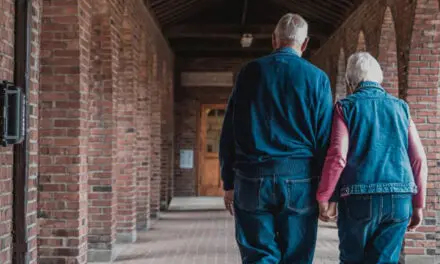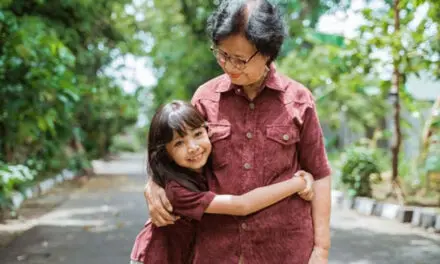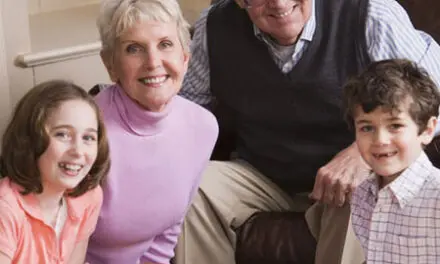by Rick Johnson
Bob and Mary were enjoying their retirement years by traveling and spending leisure time together. They never thought they’d be parenting young children again, but their daughter got hooked on meth and they had no other choice but to take in her three kids.
After years of trying to help her and paying for multiple failed rehabilitation stints, they finally decided they had no choice but to petition the court for permanent custody of their grandchildren. All had different fathers, causing a nightmare of court appearances, Child Protective Services (CPS) visits, and hearings concerning the relinquishment of parental rights before Bob and Mary were finally able to take in their thoroughly wounded grandkids (which by then had increased to four).
But the challenges had only just begun.
If you are like me and my wife, your life went from being a happy, contented empty nest to a whirlwind of chaos and drama. That’s how it was when we adopted our granddaughter after our son passed away. We went from golden sunsets to loud and hectically busy days. Overnight, I went from contemplating my retirement to realizing I’ll probably never retire until lunchtime on the day I die.
Or perhaps you’ve never stopped raising children. Some people live their lives to raise children and are ecstatic about raising their grandchildren. In fact, in certain cultures (even in the U.S.), some women define themselves by being mothers and grandmothers who raise children their entire lives. And to them I say, “God bless you!”
For the rest of us, though, it’s important to recognize and even admit some of our less-than-noble emotions in this situation, even if only to ourselves. Personally, I was reluctant—even a bit resentful—to take on the task of raising another child, especially in my late fifties. But Frank’s death and his wife’s mental illness forced us to take on this herculean task. It was either that or allow our granddaughter to be put into the foster care system—something neither my wife nor I could morally allow, even though our granddaughter’s biological mother only allowed us to see her twice, briefly, up until we took custody of her.
When you lose your parents, you’re an orphan. When you lose a husband, you’re a widow. But when you lose a child (either physically or emotionally), there isn’t a name for that. The most difficult thing I’ve ever had to hear was that my child had died. The hardest thing I’ve ever done is to live every day since. But do you know what the saddest sound in the world is? Hearing my wife sobbing in the shower over our late son.
Remember that even if your adult child is not dead, if they have abandoned their child for whatever reason, you will likely struggle with grief. It’s one of the strongest emotions grandparents struggle with after they start raising a grandchild.
Stages of Grief
You may be familiar with these stages, but they are worth looking at in more depth as they apply to this challenge of raising our grandkids.
Shock or Denial
Some people do not go through this phase, but others will feel numb, with no emotions or tears. This stage helps us survive loss. Sometimes there is denial. Shock eventually wears off, and people are able to cry or release their emotions in some other way.
Anger
Anger is a very important part of the healing process. In the classic book on the topic, On Grief and Grieving, Elisabeth Kübler-Ross and David Kessler write:
You may ask, “Where is God in this?” … Underneath anger is pain, your pain…. It is natural to feel deserted and abandoned, but we live in a society that fears anger…. Anger is strength and it can be an anchor, giving temporary structure to the nothingness of loss. At first grief feels like being lost at sea: no connection to anything. Then you get angry at someone, maybe a person who didn’t attend the funeral, maybe a person who isn’t around, maybe a person who is different now that your loved one has died. Suddenly you have a structure—your anger toward them.
This also includes the tendency to respond with irritability and anger towards others. Often there may be feelings of offense or hostility towards family members who do not—or for various reasons cannot—provide the emotional support the bereaved person may have expected from them.
Bargaining or Preoccupation with Deceased
Bargaining is where we try to make deals with God, wanting our life to go back to normal and see our loved one restored. In preoccupation, the grieving person thinks about the deceased continually. For example, in this stage a widowed person might continue to feel married for a long period of time. This is normal.
Depression
Understand that this is not a sign of mental illness, but an appropriate response to a great loss. This is not something to be fixed or to “snap out of.” Depression is normal for those in grief. Often, grieving people feel total despair, unbearable loneliness, and overwhelming hopelessness. Nothing seems worthwhile. I probably went through at least two years of depression in my journey.
Acceptance
This is where people begin to feel the hurt. If one does not express this emotion, it will manifest itself in other ways, usually physically or emotionally. As an example, for the entire second year after the loss of our son, I was literally sick with one illness or another. None of them were medically explainable. Certainly, they were a symptom of my grief. Men especially may struggle with this stage as our culture makes men feel uneasy about crying; therefore, they stuff their emotions. Acceptance is not about “feeling okay” with what happened. It is accepting reality and learning to live with it.
Understand that even if your child is still alive, if you have lost them in some way, such as to drug addiction or incarceration, you will be grieving. Recognize your grief and learn how to process it. It’s not a process most of us are familiar with. Seeking professional help in no way means you are weak or somehow inferior.
Remember, you need to be healed and healthy in order to help your grandchildren overcome their loss.
Rick Johnson is a bestselling author of numerous books on parenting and relationships, including When Grandparents Become Parents: How to Succeed at Raising Your Children’s Children. He is a sought-after speaker around the US and Canada, and the founder and director of a fathering skills ministry called Better Dads. Rick and his wife Suzanne live in northern Texas.






